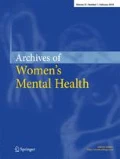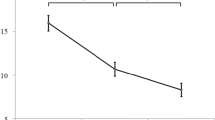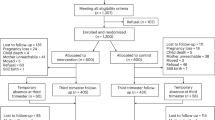Abstract
Substantial evidence links antenatal depression, anxiety and stress with negative effects on foetal development, resulting in enduring problems in child development. Despite this, there is a paucity of research on intervention programmes designed to address depression and anxiety, and none that include infant outcomes. We aimed to evaluate the efficacy of a brief treatment for maternal depression and anxiety in pregnancy in a sample of women with a diagnosed depressive disorder. We developed a cognitive behavioural therapy treatment for antenatal depression and anxiety and evaluated it in a feasibility trial. This was followed by a pilot randomised controlled trial (RCT) which collected data on the efficacy of the brief intervention and follow-up data on infants. The feasibility study (n = 25) yielded promising results for adherence, acceptability and improvements in depression and anxiety (Beck Depression Inventory and Beck Anxiety Inventory). The RCT (n = 54) again showed excellent adherence and acceptability and supported the efficacy of the treatment. Strong reductions in anxiety were observed during pregnancy, and improvements in depression were maintained at 9 months representing a moderately large effect size. Nine-month infant outcomes showed several medium to large effects favouring the intervention in domains including problem solving, self-regulation and stress reactivity, which were independent of maternal postnatal mood. Treating severe depression and anxiety during pregnancy with a brief cognitive behavioural therapy (CBT) intervention appears feasible and worthwhile. To reliably detect clinically meaningful effects on infant outcomes, larger RCTs are likely to be required.


Similar content being viewed by others
References
Adewuya AO, Eegunranti AB, Lawal AM (2005) Prevalence of postnatal depression in Western Nigerian women: a controlled study. Int J Psychiatry Clin Pract 9(1):60–64. doi:10.1080/13651500510018211
American Psychiatric Association (2000) Diagnostic and statistical manual of mental disorders—text revision, 4th edn. American Psychiatric Press, Washington, DC
Arch J (2014) Cognitive behavioral therapy and pharmacotherapy for anxiety: treatment preferences and credibility among pregnant and non-pregnant women. Behav Res Ther 52:53–60
Austin M (2003) Psychosocial assessment and management of depression and anxiety in pregnancy. Aust Fam Physician 32:1–8
Austin M, Tully L, Parker G (2007) Examining the relationship between antenatal anxiety and postnatal depression. J Affect Disord 101(1–3):169–174
Bayley N (2005) Bayley scales of infant development, 3rd edn. Pearson PsychCorp, USA
Beck CT (2001) Further validation of the postpartum depression screening scale. Nurs Res 50(3):155–164
Beck AT, Epstein N, Brown G, Steer RA (1988) An inventory for measuring clinical anxiety: psychometric properties. J Consult Clin Psychol 56:893–897
Beck AT, Steer RA, Brown GK (1996) BDI-II manual. The Psychological Corporation, San Antonio
Bergman K, Sarkar P, O’Connor TG, Modi N, Glover V (2007) Maternal stress during pregnancy predicts cognitive ability and fearfulness in infancy. J Am Acad Child Adolesc Psychiatry 46(11):1454–1463. doi:10.1097/chi.0b013e31814a62f6
Bricker D, Squires J (1999) Ages and stages questionnaire: Brookes Publishing Co
Burns A, O’Mahen H, Baxter H, Bennert K, Wiles N, Ramchandani P et al (2013) A pilot randomised controlled trial of cognitive behavioural therapy for antenatal depression. BMC Psychiatry 13(1):33
Carter FA, Carter JD, Luty SE, Wilson DA, Frampton CM, Joyce PR (2005) Screening and treatment for depression during pregnancy: a cautionary note. Aust N Z J Psychiatry 39(4):255–261
Center on the Developing Child at Harvard University (2009) Maternal depression can undermine the development of young children: working paper no. 8. Retrieved from http://www.developingchild.harvard.edu
Cho HJ, Kwon JH, Lee JJ, Cho HJ, Kwon JH, Lee JJ (2008) Antenatal cognitive-behavioral therapy for prevention of postpartum depression: a pilot study. Yonsei Med J 49(4):553–562
Chung TKH, Lau TK, Yip ASK, Chiu HFK, Lee DTS (2001) Antepartum depressive symptomatology is associated with adverse obstetric and neonatal outcomes. Psychosom Med 63:830–834
Clatworthy J (2012) The effectiveness of antenatal interventions to prevent postnatal depression in high-risk women. J Affect Disord 137(1–3):25–34
Cohen J (1992) A power primer. Psychol Bull 112(1):155–159
Coverdale JH, McCullough LB, Chervenak FA, Bayer T (1996) Clinical implications and management strategies when depression occurs during pregnancy. Aust N Z J Obstet Gynaecol 36:424–429
Cox J, Holden J, Sagovsky R (1987) Detection of postnatal depression: development of a 10 item postnatal depression scale. Brit J Psychiat 150:782–786
Cuijpers P, Muñoz R, Clarke G, Lewinsohn P (2009a) Psychoeducational treatment and prevention of depression: the “coping with depression” course thirty years later. Clin Psychol Rev 29(5):449–458
Cuijpers P, Smit F, Bohlmeijer E, Hollon SD, Andersson G (2009b) Efficacy of cognitive-behavioural therapy and other psychological treatments for adult depression: meta-analytic study of publication bias. Br J Psychiatry 196:173–178
Cutrona CE (1984) Social support and stress in the transition to parenthood. J Abnorm Psychol 93:378–390
Dayan J, Creveuil C, Marks MN, Conroy S, Herlicoviez M, Dreyfus M, . . . Tordjman S (2006) Prenatal depression, prenatal anxiety, and spontaneous preterm birth: a prospective cohort study among women with early and regular care. Psychosom Med 68(6): 938–946
de Weerth C, Buitelaar JK, Mulder EJH (2005) Prenatal programming of behavior, physiology and cognition. Neurosci Biobehav Rev 29(2):207–208
Dennis CL, Dowswell T (2013) Interventions (other than pharmacological, psychosocial or psychological) for treating antenatal depression. Cochrane Database Syst Rev 7, CD006795. doi:10.1002/14651858.CD006795.pub3
Dennis CL, & Hodnett E (2007) Psychosocial and psychological interventions for treating postpartum depression. Cochrane database of systematic reviews, issue 4. doi:10.1002/14651858.CD006116.pub2
Evans L, Myers M, Monk C (2008) Pregnant women’s cortisol is elevated with anxiety and depression—but only when comorbid. Arch Women’s Ment Health 11(3):239–248. doi:10.1007/s00737-008-0019-4
Feldman R, Greenbaum CW, Mayes LC, Erlich SH (1997) Change in mother-infant interactive behavior: relations to change in the mother, the infant, and the social context. Infant Behav Dev 20(2):151–163. doi:10.1016/S0163-6383(97)90018-7
Field T, Diego M, Hernandez-reif M, Vera Y, Gil K, Schanberg S, . . . Gonzalez-Garcia A (2004) Prenatal maternal biochemistry predicts neonatal biochemistry. Int J Neurosci 114(8):933–945. doi:10.1080/00207450490461305
First MB, Spitzer RL, Gibbon M (1996) Structured clinical interview for DSM-IV axis I disorders, patient edition (SCID-I/P, version 2.0). American Psychiatric Press, Washington DC
Garstein MA, Rothbart MK (2003) Studying infant temperament via the revised infant behaviour questionnaire. Infant Behav Dev 26:64–86
Gavin NI, Gaynes BN, Lohr KN, Meltzer-Brody S, Gartlehner G, Swinson T (2005) Perinatal depression: a systematic review of prevalence and incidence. Obstet Gynecol 106(5 Pt 1):1071–1083
Glover V (2014) Maternal depression, anxiety and stress during pregnancy and child outcome; what needs to be done. Best Pract Res Clin Obstet Gynaecol 28(1):25–35. doi:10.1016/j.bpobgyn.2013.08.017
Gottlieb LN, Mendelson MJ (1995) Mothers’ moods and social support when a second child is born. Matern Child Nurs J 23(1):3–14
Holcomb W, Stone L, Lustman P, Gavard J, Mostello D (1996) Screening for depression in pregnancy: characteristics of the Beck Depression Inventory. Obstet Gynecol 88:1021–1025
Ji S, Long Q, Newport DJ, Na H, Knight B, Zach EB, . . . Stowe ZN (2011) Validity of depression rating scales during pregnancy and the postpartum period: impact of trimester and parity. J Psychiatr Res 45(2):213–219. doi:10.1016/j.jpsychires.2010.05.017
Kurki T, Hiilesmaa V, Raitasalo R, Mattila H, Ylikorkala O (2000) Depression and anxiety in early pregnancy and risk for preeclampsia. Obstet Gynaecol 95:487–493
Laplante DP, Barr RG, Brunet A, Du Fort GG, Meaney ML, Saucier JF, . . . King S (2004) Stress during pregnancy affects general intellectual and language functioning in human toddlers. Pediatr Res 56(3):400–410. doi: 10.1203/01.pdr.0000136281.34035.44
Laplante DP, Brunet A, Schmitz N, Ciampi A, King S, Laplante DP, . . . King S (2008). Project Ice Storm: prenatal maternal stress affects cognitive and linguistic functioning in 5 1/2-year-old children. J Am Acad Child Adolesc Psychiatry 47(9):1063–1072
Leigh B, Milgrom J (2008) Risk factors for antenatal depression, postnatal depression and parenting stress. BMC Psychiatry 8:24. doi:10.1186/1471-244x-8-24
Lewinsohn PM, Antonuccio DO, Steinmetz JL, Teri L (1984) The coping with depression course: a psycho-educational intervention for unipolar depression. Castalsa Publishing Company, Eugene
McGregor M, Coghlan M, Dennis CL (2013) The effect of physician-based cognitive behavioural therapy among pregnant women with depressive symptomatology: a pilot quasi-experimental trial. Early Interv Psychiatry. doi:10.1111/eip.12074
Meades R, Ayers S (2011) Anxiety measures validated in perinatal populations: a systematic review. J Affect Disord 133(1–2):1–15. doi:10.1016/j.jad.2010.10.009
Meijer J, Bockting C, Beijers C, Verbeek T, Stant A, Ormel J, . . . Burger H (2011) PRegnancy Outcomes after a Maternity Intervention for Stressful EmotionS (PROMISES): study protocol for a randomised controlled trial. (12):157. doi:10.1186/1745-6215-12-157
Milgrom J, Meager I (1996) Group treatment for post-partum depression: a pilot study. Aust N Z J Psychiatry 30(6):750–758
Milgrom J, Martin PR, Negri LM (1999) Treating postnatal depression. A psychological approach for health care practitioners. Wiley, Chichester
Milgrom J, Ericksen J, Negri L, Gemmill A (2005a) Screening for postnatal depression in routine primary care: properties of the Edinburgh Postnatal Depression Scale in an Australian sample. ANZJ Psychiatry 39:833–839
Milgrom J, Negri LM, Gemmill AW, McNeil M, Martin PR (2005b) A randomized controlled trial of psychological interventions for postnatal depression. Br J Clin Psychol 44(4):529–542
Milgrom J, Gemmill AW, Bilszta JL, Hayes B, Barnett B, Brooks J, . . . Buist A (2008) Antenatal risk factors for postnatal depression: a large prospective study. J Affect Disord 108:147–157
Moher D, Hopewell S, Schulz KF, Montori V, Gotzsche PC, Devereaux PJ, . . . Altman DG (2010) CONSORT 2010 explanation and elaboration: updated guidelines for reporting parallel group randomised trials. BMJ 340:c869
Monk C, Georgieff MK, Osterholm EA (2013) Research review: maternal prenatal distress and poor nutrition—mutually influencing risk factors affecting infant neurocognitive development. J Child Psychol Psychiatry 54(2):115–130. doi:10.1111/jcpp.12000
NIMH (2003) The strategic plan for mood disorders research [NIH Publication No. 03–5121]
O’Connor TG, Heron J, Golding J, Beveridge M, Glover V (2002) Maternal antenatal anxiety and children’s behavioural/emotional problems at 4 years—report from the Avon longitudinal study of parents and children. Br J Psychiatry 180:502–508. doi:10.1192/bjp.180.6.502
O’Connor TG, Monk C, Fitelson EM (2014) Practitioner review: maternal mood in pregnancy and child development—implications for child psychology and psychiatry. J Child Psychol Psychiatry 55(2):99–111. doi:10.1111/jcpp.12153
O’Mahen H, Himle JA, Fedock G, Henshaw E, Flynn H (2013) A pilot randomized controlled trial of cognitive behavioral therapy for perinatal depression adapted for women with low incomes. Depression Anxiety 30:679–687
O'Connor TG, Heron J, Glover V (2002) Antenatal anxiety predicts child behavioral/emotional problems independently of postnatal depression. J Am Acad Child Adolesc Psychiatry 41(12):1470–1477. doi:10.1097/00004583-200212000-00019
Orr ST, James SA, Blackmore Prince C (2002) Maternal prenatal depressive symptoms and spontaneous preterm births among African-American women in Baltimore, Maryland. Am J Epidemiol 156:797–802
Pluess M, Bolten M, Pirke KM, Hellhammer D (2010) Maternal trait anxiety, emotional distress, and salivary cortisol in pregnancy. Biol Psychol 83(3):169–175. doi:10.1016/j.biopsycho.2009.12.005
Putnam SP, Helbig AL, Gartstein MA, Rothbart MK, Leerkes E (2014) Development and assessment of short and very short forms of the infant behavior questionnaire-revised. J Personal Assess 1–14. doi:10.1080/00223891.2013.841171
Rodriguez A, Bohlin G (2005) Are maternal smoking and stress during pregnancy related to ADHD symptoms in children? J Child Psychol Psychiatry 46(3):246–254. doi:10.1111/j.1469-7610.2004.00359.x
Schuurmans C, Kurrasch DM (2013) Neurodevelopmental consequences of maternal distress: what do we really know? Clin Genet 83:108–117
Sockol L, Epperson C, Barber J (2011) A meta-analysis of treatments for perinatal depression. Clin Psychol Rev 31:839–849
Spinelli MG, Endicott J, Leon AC, Goetz RR, Kallish RB, Brustman LE, . . . Schulick JL (2013) A controlled clinical treatment trial of interpersonal psychotherapy for depressed pregnant women at 3 New York City sites. J Clin Psychiatry 74(4):393–399
Squires J, Bricker D, Twombly E (2002) The ASQ:SE user’s guide. Paul H. Brookes Publishing
Squires J, Twombly E, Bricker D, Potter L (2009) ASQ-3 user’s guide. Paul H. Brookes, Baltimore
Talge N, Neal C, Glover V (2007) Antenatal maternal stress and long-term effects on child neurodevelopment: how and why? J Child Psychol Psychiatry 48:245–261
Teng HW, Hsu CS, Shih SM, Lu ML, Pan JJ, Shen WW, . . . Shen WW (2005) Screening postpartum depression with the Taiwanese version of the Edinburgh Postnatal Depression Scale. Compr Psychiatry 46(4):261–265
Thomas N, Komiti A, Judd F (2014) Pilot early intervention antenatal group program for pregnant women with anxiety and depression. Arch Women’s Mental Health. doi:10.1007/s00737-014-0447-2
Van Batenburg-Eddes T, Brion MJ, Henrichs J, Jaddoe VWV, Hofman A, Verhulst FC, . . . Tiemeier H (2013) Parental depressive and anxiety symptoms during pregnancy and attention problems in children: a cross-cohort consistency study. J Child Psychol Psychiatry 54(5):591–600. doi:10.1111/jcpp.12023
Van den Bergh BRH, Marcoen A (2004) High antenatal maternal anxiety is related to ADHD symptoms, externalizing problems, and anxiety in 8-and 9-year-olds. Child Dev 75(4):1085–1097. doi:10.1111/j.1467-8624.2004.00727.x
Van den Bergh BRH, Mennes M, Oosterlaan J, Stevens V, Stiers P, Marcoen A, Lagae L (2005a) High antenatal maternal anxiety is related to impulsivity during performance on cognitive tasks in 14-and 15-year-olds. Neurosci Biobehav Rev 29(2):259–269. doi:10.1016/j.neubiorev.2004.10.010
Van den Bergh BRH, Mulder EJH, Mennes M, Glover V (2005b) Antenatal maternal anxiety and stress and the neurobehavioural development of the fetus and child: links and possible mechanisms. A Rev Neurosci Biobehav Rev 29(2):237–258. doi:10.1016/j.neubiorev.2004.10.007
Waters CS, Hay DF, Simmonds JR, van Goozen SHM (2014) Antenatal depression and children’s developmental outcomes: potential mechanisms and treatment options. Arch Women’s Mental Health. doi:10.1007/s00787-014-0582-3
WHO (1993) Composite international diagnostic interview 1.1—interviewer manual. American Psychiatric Press Inc., Washington, D.C
Wisner K, Sit DY, McShea MC, Rizzo DM, Zoretich RA, Hughes C L, . . . Hanusa BH (2013) Onset timing, thoughts of self-harm, and diagnoses in postpartum women with screen-positive depression findings. JAMA Psychiatry 70, 490–498. doi:10.1001/jamapsychiatry.2013.87
Zhu P, Sun M-S, Hao J-H, Chen Y-J, Jiang X-M, Tao R-X, . . . Tao F-B (2014) Does prenatal maternal stress impair cognitive development and alter temperament characteristics in toddlers with healthy birth outcomes? Dev Med Child Neurol 56(3):283–289. doi:10.1111/dmcn.12378
Acknowledgments
The feasibility study was funded by Australian Rotary Health. The RCT was funded by the MBF/BUPA foundations, Australian Rotary Health, Urquhart Charitable Fund and Austin Medical Research Foundation. We thank the participating women and staff at the hospitals involved.
Conflict of interest
The authors declare that they have no conflict of interest.
Author information
Authors and Affiliations
Corresponding author
Rights and permissions
About this article
Cite this article
Milgrom, J., Holt, C., Holt, C.J. et al. Feasibility study and pilot randomised trial of an antenatal depression treatment with infant follow-up. Arch Womens Ment Health 18, 717–730 (2015). https://doi.org/10.1007/s00737-015-0512-5
Received:
Accepted:
Published:
Issue Date:
DOI: https://doi.org/10.1007/s00737-015-0512-5




